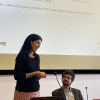Findings from the Wellbeing INDEX project based on the latest statistics compiled by the National Statistics Office, were presented to Parliament today to coincide with International Day of Happiness.
Launched four years ago by the Malta Foundation for the Wellbeing of Society and the University of Malta, this Wellbeing INDEX project — focusing on Indicators, Networking, Data, Exploration and eXchange — serves as a vital repository of data on the island’s wellbeing that is not simply pegged to the country’s Gross Domestic Product.
The extensive research gathered over these years has been so instrumental in deepening the understanding of Malta’s wellbeing that the University and the Malta Foundation for the Wellbeing of Society have agreed to extend this project by three years to further strengthen Malta’s commitment to a wellbeing economy.
MFWS founder Marie-Louise Coleiro Preca said: “This year marks a pivotal moment in Malta’s economic discourse and vision. I believe wellbeing should be placed at the core of governance, and policymaking. For far too long, we’ve measured success solely by GDP growth, often neglecting the fundamental question: Are our people truly flourishing?
“The Wellbeing INDEX project was launched to answer this very question, offering an evidence-based framework to ensure policies prioritise what truly matters—happiness, life satisfaction and the essential factors that influence these, such as health, social cohesion and material security,” she said.
Prof. Alfred Vella (UM Rector) added that the project’s next phase will continue to update Malta’s wellbeing indicators, expand research on children’s welfare, and develop the Wellbeing INDEX project into a comprehensive data hub. The project will also aim to build public sector capacity through wellbeing training, and establish Malta’s first repository of wellbeing interventions, among other initiatives.
The findings are extrapolated from the National Statistics Office and built on annual surveys conducted among 4,000 households and 10,000 people.
Giving a presentation, Prof. Briguglio, together with her colleagues Ms Natalia Mangion and Prof. Joel Azzopardi, said that when comparing 2023 to the previous year, the indicators showed an improvement in personal relationship and financial satisfaction.
“However, the data show we have flatlined on life and job satisfaction, and we fared worse with time satisfaction; an area where we were already not doing particularly well,” she said. Though we do better than the EU average on life satisfaction, we have slipped down in world rankings as captured by the latest World Happiness Report, issued today.
Prof. Briguglio urged policymakers to address the needs of 14,854 individuals whose life satisfaction rates were below four out of 10, and to explore the potential of improving the lot of 85,820 others whose contentment ranged between four and six out of 10.
“We need to address inequalities in wellbeing besides inequalities in income,” she said, noting that the number of people in ‘absolute misery’ rose to 8,323 in 2023, from 5,398 in 2022.
“We need to address inequalities in wellbeing besides inequalities in income,” she said, noting that the number of people in ‘absolute misery’ rose to 8,323 in 2023, from 5,398 in 2022.
“We have to safeguard the wellbeing of those who don’t have it so good. We need to watch out for the unemployed, the materially deprived, the ill, those living in poor quality dwellings, those experiencing noise in their neighbourhood, and single parents, all of whom endure lower levels of wellbeing by several indicators over several years. This is clear for all to see from the data visualisations,” she said.
Reflecting on the past four years, Ms Coleiro Preca stressed that the Wellbeing INDEX Project relied on collaboration with all stakeholders — government entities, civil society, businesses, researchers, and community leaders — as their insights, were vital in shaping policies that reflected society’s real needs.
“This project is more than just research; it is a call to action. It is about ensuring that every policy, every initiative, and every decision contributes to a society where every individual can lead a fulfilling, dignified life. Together, let us champion a future where wellbeing is not just a concept, but a reality for every person in Malta.”



